A snapshot of Hungarian consumers
The Hungarian Consumer Conference 2008 was held for the second time in early June. Unconventional, interactive presentations helped the 200 participants to learn more about Hungarian consumers. Hungarian consumers do not like to engage in irrational conflicts, but are open to emotional manipulation. They often buy things they cannot afford and complain when they do not get the attention they expect. “I buy therefor I am “ was the motto of the presentation held by Ákos Kozák, director of GfK Hungária and newly elected chairman of the Hungarian Marketing Association. He spoke about the growth of nostalgia about the past and the fact that 42 per cent of Hungarians are very disappointed with the market economy. Andrea Máger (Economic Competition Office) talked about competition-focused consumer protection and the activities of the Office. She emphasised that the purpose of fines is to guarantee consumers receive correct information. Tamás Wittich (Consumer Protection Authority) noted that Hungarian consumers are not highly conscious and are easy to manipulate emotionally. The lack of consciousness on the part of consumers was also the subject of the provocative presentation held by dr. Imre Csernus. Róbert Braun (Braun and Partners) spoke about people concerned, instead of consumers, who make emotional decisions and regard all things as separate identities (brands). He portrayed local companies as absolutist organisations from the 17th century which represent opposite values compared to those of the people concerned. The topic of the presentation by dr. Márta Hoffmann (Hoffmann Research International) was what single women need. Their attitudes are the same as those of married women with a few exceptions. Péter Novák (kirowski) revealed that 15-24 age group spens more time surfing on the Internet than watching TV. László Mérő and Balázs Szekfű (Darwin’s Marketing Evolutions) spoke about a modern approach to communication based on the virus-like spreading of information and a new evolutionary marketing model. Zoltán Paksy (Saatchi & Saatchi) pointed out that brands will soon have to begin regarding consumers as inspired human beings who need intimate gestures, instead of simply regarding them as regular users.







